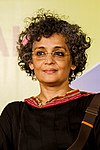Wikipedia:VideoWiki/Arundhati Roy
| VideoWiki/Arundhati Roy (Tutorial) | |
|---|---|
| File:En.Video-Arundhati Roy.webm | |
| Link to Commons | |
| Steps for video creation | |
| Step 1 | Preview my changes (10 sec) |
| Step 2 | Upload to Commons (10 min) |
Introduction
[edit]Suzanna Arundhati Roy is an Indian author best known for her novel The God of Small Things in 1997, which won the Man Booker Prize for Fiction and became the biggest-selling book by a non-expatriate Indian author.

Early life
[edit]Arundhati Roy was born in Shillong Meghalaya India, to Mary Roy and Rajib Roy. When she was two, her parents divorced and she returned to Kerala with her mother and brother.[1]

Schooling
[edit]Roy attended school at Corpus Christi Kottayam, followed by the Lawrence School, Lovedale in Nilgiris Tamil Nadu.

SPA
[edit]She then studied architecture at the School of Planning and Architecture, Delhi.[1]

Career
[edit]She initially assumed a position at National Institute of Urban Affairs.

Marriage
[edit]In 1984, she met independent filmmaker Pradip Krishen, who offered her a role as a goatherd in his award-winning movie Massey Sahib.[2] Later the two married, but eventually separated.[1]

Screenplay writing
[edit]She wrote the screenplays for In Which Annie Gives It Those Ones, a movie based on her experiences as a student of architecture, and Electric Moon in 1992.[3]

Criticism of Bandit Queen
[edit]She attracted attention in 1994 when she criticised Shekhar Kapur's film Bandit Queen, which was based on the life of Phoolan Devi.[3]

First novel
[edit]The publication of The God of Small Things catapulted Roy to international fame. It received the 1997 Booker Prize for Fiction.[4] It reached fourth position on The New York Times Bestsellers list for Independent Fiction.[5]

Response
[edit]From the beginning, the book was also a commercial success: Roy received half a million pounds as an advance.[6] It was published in May, and the book had been sold in 18 countries by the end of June.[7]

Essays and adoption by Penguin India
[edit]She has written numerous essays on contemporary politics and culture. They have been collected by Penguin India in a five-volume set.[1]

Second novel
[edit]In October 2016, Penguin India and Hamish Hamilton UK announced that they would publish her second novel, The Ministry of Utmost Happiness in June 2017.[8]

Advocacy
[edit]Since publishing her first novel, Roy has spent most of her time on political activism and essays about social causes. She is a spokesperson of the anti-globalization/alter-globalization movement.[9]

Support for Kashmiri separatism
[edit]In an August 2008 interview with The Times of India, Roy expressed her support for the independence of Kashmir from India after the massive demonstrations in 2008 in favour of independence took place.[10]

Sardar Sarovar Project
[edit]Roy has campaigned along with activist Medha Patkar against the Narmada dam project, saying that the dam will displace half a million people with little or no compensation, and will not provide the projected irrigation, drinking water, and other benefits.[11]

US foreign policy, war in Afghanistan
[edit]In an opinion piece in The Guardian titled "The Algebra of Infinite Justice", Roy responded to the US military invasion of Afghanistan, finding fault with the argument that this war would be a retaliation for the September 11 attacks.[12]

India's nuclear weaponry
[edit]In response to India's testing of nuclear weapons in Pokhran, Rajasthan, Roy wrote The End of Imagination in 1998, a critique of the Indian government's nuclear policies.[13]
Anti-Zionism
[edit]In August 2006, Roy, along with Noam Chomsky, Howard Zinn, and others, signed a letter in The Guardian calling the 2006 Lebanon War a "war crime" and accusing Israel of "state terror".[14]

2001 Indian parliament attack
[edit]Roy has raised questions about the investigation into the 2001 Indian Parliament attack and the trial of the accused. She had called for the death sentence of Mohammad Afzal to be stayed while a parliamentary enquiry into these questions is conducted.[15]

The Muthanga incident
[edit]Roy met the leader's of Adivasi Gothra Maha Sabha, a social movement for Adivasi land rights in Kerala, in jail, and wrote an open letter to the then Chief Minister of Kerala AK Antony saying "You have blood on your hands."[16]

Comments on 2008 Mumbai attacks
[edit]In an opinion piece for The Guardian, Roy argued that the November 2008 Mumbai attacks cannot be seen in isolation, but must be understood in the context of wider issues in the region's history and society such as widespread poverty.[17]
Criticism of Sri Lankan government
[edit]In an opinion piece in The Guardian, Roy pled for international attention to what she called a possible government-sponsored genocide of Tamils in Sri Lanka.[18]

Views on the Naxalites
[edit]Roy has criticised the Indian government's armed actions against the Naxalite-Maoist insurgency in India, calling it "war on the poorest people in the country". According to her, the government has "abdicated its responsibility to the people"[19]

Sedition charges
[edit]In November 2010, Roy, Syed Ali Shah Geelani, and five others were brought up on charges of sedition by the Delhi Police. A Delhi city court directed the police to respond to the demand for a criminal case after the central government declined to charge Roy, saying that the charges were inappropriate.[20]

Criticism of Anna Hazare
[edit]On 21 August 2011, at the height of Anna Hazare's anti-corruption campaign, Roy criticised Hazare and his movement in an opinion piece published in The Hindu, in which she questioned Hazare's secular credentials.[21]

Views on Narendra Modi
[edit]In 2013, Roy described Narendra Modi's nomination for the prime ministerial candidate as a "tragedy". She further said that the business houses were supporting his candidacy because he was the "most militaristic and aggressive" candidate.[22]

Awards
[edit]Apart from the Booker Prize, for her novel, she also won the Sahitya Akademi Award, a national award from India's Academy of Letters, for her collection of essays on contemporary issues The Algebra of Infinite Justice, but she declined to accept it.[23][24]

References
[edit]- ^ a b c d Siddhartha Deb, "Arundhati Roy, the Not-So-Reluctant Renegade Archived 21 April 2016 at the Wayback Machine", The New York Times, 5 March 2014. Accessed 5 March 2014.
- ^ Massey Sahib at IMDb
- ^ a b "Arundhati Roy, Author-Activist" Archived 24 November 2010 at the Wayback Machine, India Today. Retrieved 16 June 2013
- ^ "Notable Books of the Year 1997". New York Times. 7 December 1997. Archived from the original on 9 December 2008. Retrieved 21 March 2007.
- ^ "Best Sellers Plus". New York Times. 25 January 1998. Retrieved 21 March 2007.
- ^ Ramesh, Randeep (17 February 2007). "Live to tell". The Guardian. London. Archived from the original on 6 May 2009. Retrieved 6 April 2009.
- ^ "Arundhati Roy announces second book after 19 yrs; to release in June 2017" Archived 18 October 2016 at the Wayback Machine. Hindustan Times. 3 October 2016. Retrieved 3 October 2016.
- ^ "Arundhati Roy: Necessary, but wrong". The Economist. 30 July 2009.
- ^ Thottam, Jyoti (4 September 2008). "Valley of Tears". Time. Retrieved 6 April 2009.
- ^ Roy, Arundhati (22 May – 4 June 1999). "The Greater Common Good". Frontline. 16 (11).
- ^ Roy, Arundhati (29 September 2001). "The algebra of infinite justice". Guardian. Retrieved 1 June 2017.
- ^ "The End Of Imagination". Outlook India. Retrieved 8 October 2019.
- ^ "War crimes and Lebanon". The Guardian. London. 3 August 2006. Retrieved 6 April 2009.
- ^ Arundhati Roy, "And His Life Should Become Extinct" Archived 3 March 2016 at the Wayback Machine, Outlook, 30 October 2006.
- ^ Roy, Arundhati (15 March 2003). "Arundhati Roy to Kerala Chief Minister Antony". Frontline. Vol. 20, no. 6. Retrieved 25 March 2009.
- ^ Roy, Arundhati (13 December 2008). "The Monster in the Mirror". The Guardian. London. Retrieved 18 January 2010.
- ^ Roy, Arundhati (1 April 2009). "This is not a war on terror. It is a racist war on all Tamils". The Guardian. London.
- ^ Karan Thapar, "India is a corporate, Hindu state: Arundhati" Archived 27 December 2013 at the Wayback Machine, CNN-IBN, 12 September 2010.
- ^ Priscilla Jebaraj (2 January 2011). "Binayak Sen among six charged with sedition in 2010". The Hindu. Retrieved 17 October 2012.
- ^ I'd rather not be Anna: Arundhati Roy Archived 23 June 2015 at the Wayback Machine. The Hindu, 21 August 2011. Retrieved 18 June 2012.
- ^ "Arundhati Roy writing her second novel". The Hindu. 11 November 2013. Retrieved 13 November 2013.
- ^ "Sahitya Akademi Award: Arundhati Roy Rejects Honor" Archived 21 August 2013 at the Wayback Machine, Deccan Herald, 16 January 2006.
- ^ "Award-Winning Novelist Rejects a Prize" Archived 6 March 2016 at the Wayback Machine, The New York Times, 17 January 2006. Retrieved 18 December 2011.
